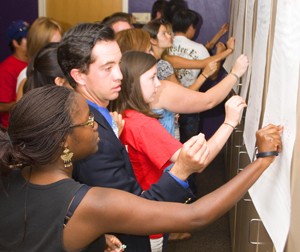The Center for Student Involvement and Leadership tackled the world of stereotypes Tuesday night, talking about racial diversity, the effects of having a color-blind society and views on particular castes in society.
“”If we look anywhere, in educational institutions, the economy, government or media, we can find examples of racism,”” said Jennifer Hoefle, senior coordinator of social justice programs and campus activities. “”We can be honest with the effects they have on ourselves and others.””
The workshop, titled “”A Lesson on Stereotypes,”” was created to determine how stereotypes impact students and what measures can be taken to prevent them.
Those in attendance placed color-coded stickers – which represent family members, friends and ideas formed from educational concepts and media – on seven different situations to highlight social views on stereotypes.
Scenarios ranged from the belief that men are smarter than women to the concept that poor people are lazy. The possible existence of a color-blind society was also scrutinized as a stereotype.
However, instead of being color-blind, Hoefle likes to say, “”Do not be blinded by color.””
“”Some of the ways we see that racism is alive is by looking at what stereotypes we hold against people,”” said Hoefle.
Hoefle said the best way to combat stereotyping is to first be advocates. “”We need to educate ourselves first and foremost.””
Political science freshman Melissa Kiguwa agreed, “”Social justice is really important, especially on a college campus with so much diversity and so little people being aware of it.””
Kiguwa said the college environment is a fertile atmosphere for students to learn about social justice and then carry those ideas beyond college.
“”Here at UA, you see so many types (of) cliques of people, and if we could just integrate it more, it would be a more beautiful thing.””
The workshop is the second in a series of seven other discussions facilitated by the CSIL. The workshops occur every Tuesday beginning at 5 p.m.









